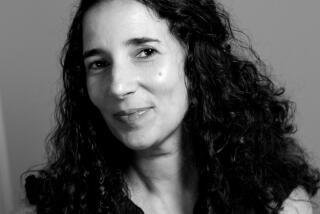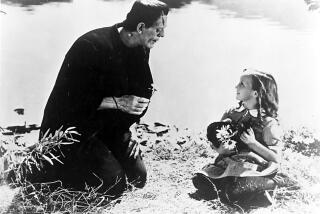A Touching Tale of Love and Transformation
- Share via
Martha and John Beck were career-driven academics who, Martha writes, “ended up going to Harvard over and over again, like addicts” in pursuit of degrees. Then along came Adam, their Down syndrome child.
“Expecting Adam: A True Story of Birth, Rebirth and Everyday Magic” (Villard, 1999) is Martha Beck’s story of the child she chose not to abort, the fear and horror she felt as she carried him and, ultimately, how Adam taught his parents to rediscover the humanity they had placed “in the Deepfreeze” while collecting all those degrees.
When an amniocentesis midway through an unplanned pregnancy in 1988 revealed an abnormal fetus, Martha was a sociologist and teaching fellow married to a doctoral candidate and “the unofficial mascot of the Franklin Dayplanner people, my schedule fixed in 15-minute intervals for years to come.”
Her dilemma was twofold: Besides the pressures of a busy life, “retarded people had always filled me with revulsion.”
She resisted pressure from doctors to abort--not because she’s against abortion but, rather, because of an inexplicable metaphysical bond she felt from the start with this baby, who seemed to be a force making extraordinary things happen.
As a friend told her, “Adam brings angels with him, just as dogs bring fleas.”
*
Angels or not, the pregnancy was terrifying. Once, when Adam kicked, she “felt a gush of absolute horror, a mixture of grief and fear so strong it almost knocked me out.” Often, she was angry.
“I felt as though some evil ogre had killed my ‘real’ baby and replaced him with an ugly, broken replica.”
These emotions alternated with fierce feelings of protectiveness, feelings exacerbated by the reaction of friends and acquaintances. In her diary she wrote, “The baby has become unmentionable, like a gift everyone knows is inferior and broken, before it’s even unwrapped.” She and John lived through the final months of her pregnancy in “careful, civilized silence,” at times fantasizing that the obstetrician would deliver their baby and shout, “Oh, my God! We made a terrible mistake.”
She writes of trying to buy a book at the Harvard Co-Op on rearing a mentally disabled child, but finding only volumes on “how to turn a human infant into a genius in the shortest time possible . . . contributing important innovations in science and letters before it achieved bowel control.”
Her mission, she realized in time, was not to try to transform this damaged baby but “to transform myself into a parent who could accept her child, no matter what.”
*
The moment of Adam’s birth was an epiphany for the Becks: They realized that it was they who had been broken and maybe Adam didn’t need fixing after all.
Because of Adam, they abandoned their merciless focus on success, a process Martha calls “the slow warming of our personal Ice Age.” A decade earlier, she writes, “Living life as a pursuit of joy would have struck me as lunacy, if not blasphemy.” But Adam, who lives for the moment, taught his parents to do so.
Martha tells a beautiful story about Christmas. Adam’s two sisters--one older, one younger--opened their gifts first, each expressing dismay that they weren’t what they’d asked for. Adam’s gift was a toy gun but, by mistake, he opened a package of batteries first. Enchanted, he ran around the house replacing batteries.
“Something about Adam,” says Martha, “always manages to see straight past the outward ordinariness of a thing to any magic it may hold inside.”
The Becks now live in Phoenix, where Martha is a career counselor and hosts a weekly TV spot, “Ask Martha,” on “Good Day Arizona.”
Adam continues to bring his parents joy with his “pure and absolute delight in simply being.” Martha has found, “I have had to unlearn virtually everything Harvard taught me about what is precious and what is garbage.”
For more reviews, read Book Review
* This Sunday: John Sanford takes us to the moon, Joseph Rykwert looks at the meaning of modern; Virginia Postrel takes on Francis Fukuyama, and Joseph Kanon looks into the new memoirs of Michael Korda. Plus children’s books.
More to Read
Sign up for Essential California
The most important California stories and recommendations in your inbox every morning.
You may occasionally receive promotional content from the Los Angeles Times.













